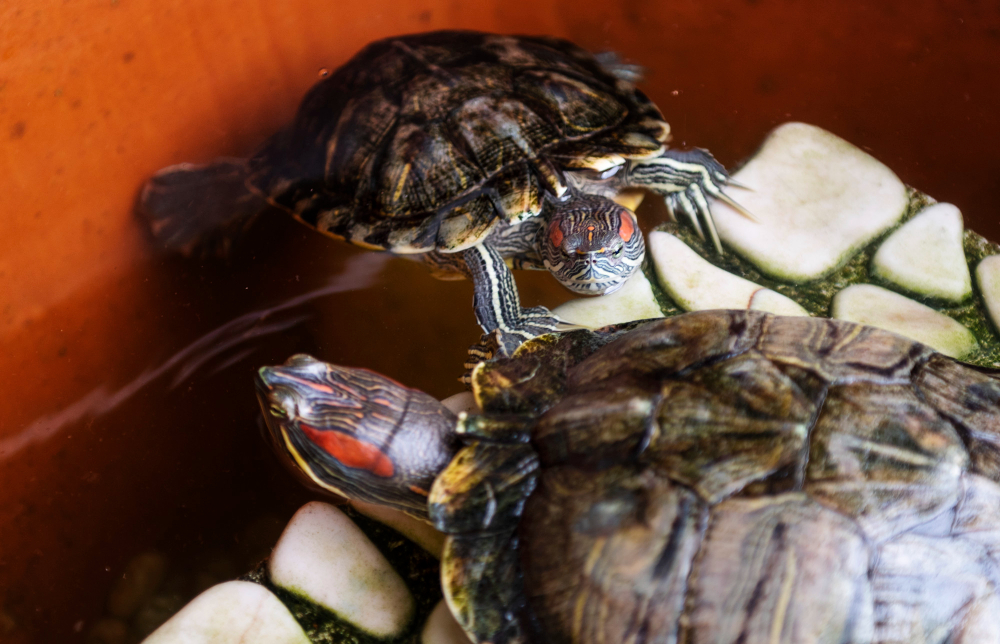Caring for a turtle can be a rewarding experience, offering a unique window into the fascinating world of these gentle reptiles. Turtles, known for their hardy shells and often long lifespans, require specific conditions to thrive in captivity. Their care demands a commitment to creating a suitable environment, understanding their dietary needs, and maintaining their health through regular check-ups. This comprehensive guide will navigate the essentials of turtle care, from setting up the perfect habitat to ensuring a balanced diet, helping you provide the best possible care for your shelled companion.
Creating the Ideal Habitat
The foundation of good turtle care lies in replicating their natural habitat as closely as possible. For aquatic turtles, this means setting up a spacious tank equipped with a powerful filter to keep the water clean and a basking area where they can dry off and absorb heat. The water temperature should be kept consistent, usually between 75-85°F, with a basking spot that’s slightly warmer. Land turtles, or tortoises, require a terrarium with ample space to roam, substrate for burrowing, and a heat source to maintain an appropriate temperature gradient. Both environments should include UVB lighting to facilitate vitamin D3 synthesis, crucial for shell and bone health.
Nutritional Needs
A turtle’s diet is pivotal to its health and longevity. While dietary needs can vary significantly between species, most turtles require a mix of proteins, vegetables, and fruits. Aquatic turtles tend to be omnivorous, enjoying a diet that includes commercially prepared turtle pellets, leafy greens, and occasional treats like feeder fish or shrimp. Tortoises are primarily herbivorous, thriving on a variety of grasses, vegetables, and fruits. It’s essential to research the specific dietary requirements of your turtle species to ensure a balanced diet that meets all their nutritional needs.
Regular Health Check-ups
Regular health assessments are vital to detect and address any potential issues early. Shell health is a common concern, with turtles prone to shell rot or pyramiding due to poor nutrition or inadequate living conditions. Signs of respiratory infections, such as wheezing or mucus around the nostrils, require immediate veterinary attention. Establishing a relationship with a vet experienced in reptile care can ensure your turtle receives the best treatment and advice for a healthy life.
The Importance of Cleanliness
Maintaining cleanliness in your turtle’s environment is critical to preventing disease and ensuring overall well-being. For aquatic turtles, frequent water changes and a robust filtration system are essential to keep the water quality high and reduce the risk of bacterial and fungal infections. Cleaning the tank, accessories, and basking areas regularly will also help maintain a healthy habitat. For tortoises, regular substrate changes and cleaning of the terrarium are necessary to prevent the buildup of waste and bacteria.
Enrichment and Social Needs
While turtles are often seen as low-maintenance pets, they benefit significantly from environmental enrichment and proper social interaction. Providing a variety of hiding spots, climbing opportunities, and objects to explore can stimulate your turtle’s mind and encourage natural behaviors. Understanding the social needs of your turtle species is also crucial; some turtles prefer solitary living, while others may thrive in pairs or small groups. Observing your turtle’s behavior can guide you in making their living environment as enriching and comfortable as possible.
The Joy of Turtle Care
Caring for a turtle is a long-term commitment that brings the joy of observing these fascinating creatures up close. By providing a suitable habitat, a balanced diet, regular health check-ups, and a clean and enriching environment, you can ensure your turtle leads a happy and healthy life. As you learn more about your turtle’s specific needs and behaviors, you’ll find that these ancient reptiles can make calm, intriguing, and rewarding pets. Whether basking in the sun or exploring their habitat, turtles offer a unique pet-keeping experience that, with the right care, can last for many years.
